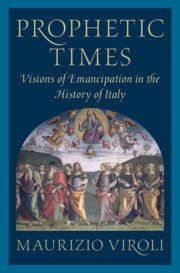Book contents
- Prophetic Times
- Prophetic Times
- Copyright page
- Dedication
- Contents
- Acknowledgments
- 1 Introduction
- 2 From Dante to the Republic of Prophets
- 3 The Decline of Prophecy and Italy’s Bondage
- 4 The Prophetic Voices of the Risorgimento and the Anti-Fascist Resistance
- 5 Epilogue
- Selected Bibliography of Primary Sources
- Selected Bibliography of Secondary Sources
- Index
4 - The Prophetic Voices of the Risorgimento and the Anti-Fascist Resistance
Published online by Cambridge University Press: 15 December 2022
- Prophetic Times
- Prophetic Times
- Copyright page
- Dedication
- Contents
- Acknowledgments
- 1 Introduction
- 2 From Dante to the Republic of Prophets
- 3 The Decline of Prophecy and Italy’s Bondage
- 4 The Prophetic Voices of the Risorgimento and the Anti-Fascist Resistance
- 5 Epilogue
- Selected Bibliography of Primary Sources
- Selected Bibliography of Secondary Sources
- Index
Summary
The history of political ideas offers amazing surprises. A sentence or even a single word in a text can suggest suppositions that catalyze research. If our suppositions are keen, the texts that we study disclose pieces of evidence that fall into place one after the other, and reveal a story that we were not aware of. When this happens, a historian’s work delivers a special intellectual felicity comparable, I imagine, to the awe and the excitement of a traveler who sees new lands and new seas, to paraphrase Machiavelli’s well-known phrase.1 I have enjoyed this sort of experience while elaborating the hypothesis that prophetic words and sentiments inspired and sustained the Italian Risorgimento. The earliest prophetic voices were those of poets, above all Vittorio Alfieri, Ugo Foscolo, and Alessandro Manzoni. The towering prophet of the Risorgimento, though, was Giuseppe Mazzini. His writings left a deep mark in the minds of Italian patriots. As the Risorgimento moved to its conclusion in 1870, a pragmatic and disillusioned intellectual mood dominated Italian culture. Prophetic voices survived only within small and marginal communities proclaiming radical egalitarian and republican ideas, and within the socialist movement. But they were all voices that had lost the warmth and faith of the Risorgimento’s prophets. It appeared as if prophecy was dead. Yet, prophetic voices surprisingly resurfaced among the militants who committed themselves to resist and fight fascism’s political religion. The purpose of this concluding chapter is to highlight this story.
- Type
- Chapter
- Information
- Prophetic TimesVisions of Emancipation in the History of Italy, pp. 167 - 238Publisher: Cambridge University PressPrint publication year: 2023

